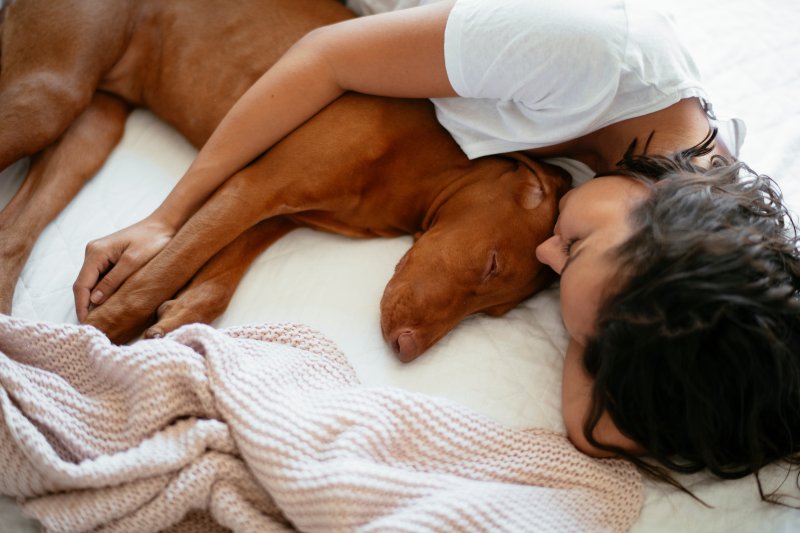Can Sleeping with Pets Impact Your Sleep Apnea?
April 12, 2022

People love their pets; almost 65% of American households own a pet, with cats and dogs being the most common companions. While there are numerous studies that show just how beneficial owning a pet can be, did you know that there are also some potential health concerns? Keep reading to learn more about how sleeping with your pets might be impacting your sleep apnea and the quality of your nightly rest.
Advantages of Sleeping with Your Pet
Many pet owners allow their pets to stay in their bedroom at night, and for good reason—according to a study done by the Center for Sleep Medicine, 41% of owners claim that their pets aren’t disruptive and that their presence even provided security, companionship, or relaxation! On top of that, some claimed that their pets helped keep them warm throughout the night; all that fur will do that!
Even though these experiences vary from person to person, the value of the data cannot be dismissed; sleep is dependent on a state of both physical and mental relaxation, and pets are sometimes a catalyst for this.
How Sleeping with Your Pet Impacts Your Sleep Apnea
Despite the noticeable advantages of sleeping with your pet, there are also discernable disadvantages; the primary one being an impact on sleep apnea. Obstructive sleep apnea, or OSA, is brought on by the partial or full blockage of the airway. Pet dander is notorious for contributing to allergies, but it can also contribute to OSA and affect your airway as you sleep. Sleep apnea already makes breathing as you rest quite difficult; adding pet hair into the equation certainly worsens things!
Minimizing Your Pet’s Impact on Your Sleep
Ultimately, it’s for you to decide if your pet is welcome in your bedroom at night. If you do choose to let your furry friend join you, there are a few things you can do to minimize their impact on your sleep:
- Create a comfortable spot for your pet to sleep that isn’t on your bed.
- Regularly clean your bedroom; vacuum, dust, and wash your bedsheets.
- Keep your pet clean and properly groomed.
- If you have allergies, seek the proper medication.
- Receive sleep apnea treatment if necessary—oral appliances or a CPAP machine are possible solutions but be sure to keep them away from your pet.
Although you might love sleeping with your pet, they can unfortunately complicate your sleep apnea. However, there are plenty of measures you can take to receive a good night’s sleep with them close by.
About the Author
Dr. Jacob Milner received his DDS from the University of Maryland School of Dentistry and now proudly serves families in the Owings Mills community. He has completed advanced training in many areas of dentistry, including sleep medicine and sleep apnea treatment! His practice offers a wide range of available services, and Dr. Milner and his team would be happy to assist you with your dental needs. Please feel free to schedule an appointment through their website or by telephone: (410) 902-4110.
No Comments
No comments yet.
RSS feed for comments on this post.
Sorry, the comment form is closed at this time.
